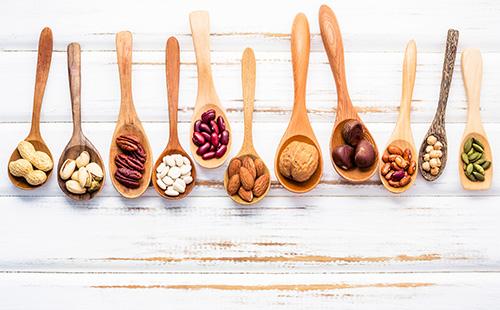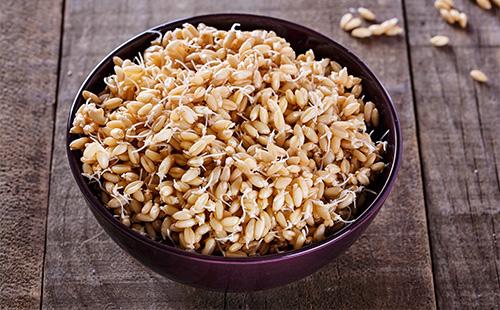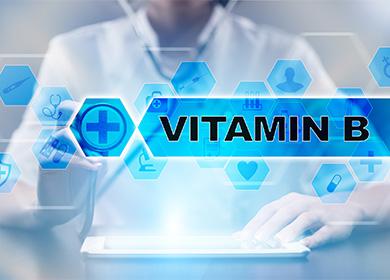The content of the article
Vitamin B is represented by a whole group of organic compounds of water-soluble nature. Some of them are synthesized by the body in sufficient quantities. The need for others cannot be completely blocked by internal synthesis. And some compounds are not synthesized at all, and their deficit overlaps only with sufficient intake with food. Different foods contain different nutrients. That is why the human diet should not only be balanced, but also diverse.
Group significance
Vitamins were discovered in 1912 by the biochemist Casimir Funk. He first gave them a name, and also began to apply it in his scientific works. Vitamin B is also discovered by Funk. In his opinion, this is a nitrogen-containing compound that affects metabolism.
To some extent Funk was right. The role of B vitamins for the conversion of various substances into energy is invaluable, but in fact, these compounds regulate a variety of chemical reactions that occur inside the body, ensuring its normal functioning. The main functions of the B vitamins are as follows:
- regulation of biochemical processes of energy conversion;
- ensuring stable operation of the cardiovascular system;
- regulation of the proper functioning of nerve tissues and transmission of nerve impulses;
- stabilization of a person’s emotional state;
- participation in the assimilation of other vitamins;
- intestinal regulation;
- ensuring the health of the hair and skin;
- regulation of cell and tissue growth processes;
- participation in neurohumoral reactions;
- providing an immune response.
Separately, it is worth mentioning the importance of B vitamins for losing weight. The main reason for gaining excess weight lies in the violation of metabolic processes, and B vitamins not only eliminate these disorders, but also prevent them, providing complete assimilation of food products. If the body is fully provided with the compounds of the group under discussion, then the risk of fatty deposits is minimized.
Key representatives
Vitamin B in various foods may vary in structure. This means that the same type of food is not able to provide the body with a whole range of compounds of this group (due to the large number of varieties). That is why the diet should be varied.
B1
Another name is thiamine. The need for thiamine may partially overlap with the body's internal synthesis. The substance is an active participant in metabolic processes at the cellular level. Provides the absorption of proteins, amino acids, the conversion of carbohydrates for energy. Responsible for the stability of the nervous system. It is considered a pep stimulator. It is necessary for the synthesis of the neurotransmitter acetylcholine, stimulates memory, activity, and stability of thought processes.
Thiamine is also directly involved in the copying and transfer of genetic material. Adults need about 2.5 mg of thiamine per day, children up to 2 mg.
Scientists have established a pattern: the more people consume carbohydrates, the greater the amount of thiamine required to process them. For example, chronic thiamine deficiency develops with alcoholism, as well as diabetes. If a person eats low-carb and protein foods, his need for thiamine intake is reduced. It is noted that the need increases dramatically with heavy metal poisoning. For therapy, it is permissible to use the maximum permitted dosage - about 5 mg per day.
- Lack of vitamin. Deficiency of B1 leads to the accumulation of under-oxidized compounds in the body, a lack of acetylcholine, and a disruption in the synthesis of amino acids. Manifested by nervous disorders (lethargy, apathy, depression, chronic fatigue, impaired concentration and memory). In severe cases, a serious nervous disease develops. With a deficiency, shortness of breath, swelling are observed. There are also disorders of the gastrointestinal tract - constipation, diarrhea, enlarged liver.
- Causes of deficiency. Improper diet, the main place in which is given to products from fine flour and sweets. Increased intake of thiaminase - a thiamine-destroying enzyme.
- How to make up for a flaw. The diet includes coarse flour, cereal bran, germinated grains. The main source of vitamin are dry brewer's yeast. A significant amount of thiamine is found in low-fat varieties of pork and liver.

AT 2
B2 (riboflavin) is considered an antiseborrheic vitamin. It can be synthesized in the colon under the condition of a normal state of intestinal microflora.
The role of B2 is the regulation of the central nervous system, the synthesis of neurotransmitters, ensuring the operation of the visual apparatus (protecting the retina from ultraviolet radiation, maintaining a healthy state of the lens). It affects the condition of the skin - ensures the normal functioning of the sebaceous glands. Provides the processes of regeneration of epithelial tissues. Activates the metabolism and synthesis of hormones by the adrenal glands. The daily requirement of adults and children ranges from 1 to 3 mg.
- Lack of vitamin. It is manifested by disorders of the skin and mucous membranes: cracks, jams, and ulcers on the lips, excessive dryness of the skin, hair loss. Also, with a deficiency of vitamin B2, the acquisition of the mucous membrane of the tongue is purple-red. Often, against the background of a lack of substance, conjunctivitis develops, accompanied by tearing, as well as burning of the mucous membranes of the eyes.
- Causes of deficiency. Lack of food intake, impaired intestinal microflora.
- How to make up for a flaw. Eat animal products: milk, eggs, meat. Sour-milk products are especially rich in vitamin B2, since lactobacilli are able to synthesize it. Also useful are green peas, lentils, beans, tomatoes, cauliflower, pears, peaches, melon.
IN 3
Also called vitamin PP or nicotinic acid. It is an active participant in respiratory processes at the cellular level. The motility of the digestive tract and the activity of secretion of digestive juices depend on it. Thanks to vitamin B3, the work of the stomach, pancreas, and liver improves. The substance affects the state of the nervous system, helps to lower blood pressure, and is a stimulant of erythropoiesis. Daily requirement ranges from 5 to 25 mg.
- Lack of vitamin. Manifested by weakness, increased fatigue, decreased mental, physical activity. Also, a dryness of the skin, their pallor, a tendency to ulcers and wounds can indicate a lack. With a lack of nicotinic acid, perversions of taste, as well as soreness of the tongue, are observed.Long-term deficiency, combined with a lack of protein substances, leads to the development of pellagra.
- Causes of deficiency. Monotonous food. Impaired absorption of vitamins from the intestines.
- How to make up for a flaw. A characteristic feature of vitamin B3 is that it is not absorbed by the body in a bound form. For example, in some cereals (corn grits). Plant sources are wheat germ and rice bran. Useful beef, veal, offal from poultry, fish oil, eggs, milk.
AT 5
B5 (pantothenic acid) is ubiquitous. It is concentrated in more or less in all food products, participates in all processes of energy and oxygen metabolism. Provides normal digestion, adrenal gland function, has anti-stress properties, takes an active part in the processes of regeneration, hematopoiesis, hemoglobin synthesis. The daily need for pantothenic acid is 5 mg. The maximum permitted daily dose is 15 mg.
- Lack of vitamin. It manifests itself as weakness, fatigue, sleep and falling asleep disorders, deterioration of the skin of hair and nails, slow healing of wounds.
- Causes of deficiency. Strict dietary restrictions, fasting. Vitamin is synthesized by symbiotic microorganisms in the intestinal lumen, therefore, acute deficiency conditions are very rare.
- How to make up for a flaw. Provide full regular nutrition with a variety of foods. Meat, dairy products, cereals and vegetables should be present in the diet. Carrots, asparagus, beets, onions, potatoes, and cucumbers are important.

AT 6
The value of vitamin B6 (pyridoxine) for the human body is simply enormous: it regulates the synthesis of neurotransmitters (serotonin, norepinephrine, dopamine), participates in the production of prostaglandins, indirectly regulating blood pressure. Vitamin is very important for nitrogen metabolism in tissues and cells, takes part in the assimilation of incoming polyunsaturated fatty acids. It is important for the proper functioning of the immune system, as it controls cell division and antibody synthesis. Provides the transfer of genetic information. The daily requirement of an adult in vitamin B6 ranges from 1.5 to 2.8 mg.
- Lack of vitamin. Pyridoxine is especially important for children, its deficiency leads to slowdown and dysplasia. During pregnancy, a deficiency of B6 leads to a sharp deterioration in the condition of the skin of the face and neck of a woman - rashes, inflammation occur. Lack of pyridoxine in an adult can cause drowsiness and lethargy, a tendency to depression, damage to the mucous membranes and skin.
- Causes of deficiency. Since the vitamin is resistant to temperature effects, it often comes in sufficient quantities with food. It is synthesized by intestinal bacteria, so the deficiency may be due to the use of antibiotics and chemotherapeutic drugs.
- How to make up for a flaw. Vitamin is found in all types of meat, millet, barley andbuckwheat cereals, in legumes. Good sources are nuts, carrots, spinach, tomatoes, cabbage, peppers, strawberries, pears.
AT 7
Vitamin B7 (biotin) regulates the activity of digestive enzymes. This compound is a participant in cellular respiration, metabolism of fats, proteins, carbohydrates. It is very important for the nervous system - it prevents neuropathies provoked by metabolic disorders (for example, with diabetes mellitus).It plays a key role in the synthesis of nucleic acids that form DNA and RNA; therefore, it is a participant in the transfer of genetic information and division of the body's own cells. It is necessary for the normal condition of the skin and hair.
The norm of daily intake is from 50 to 150 mcg.
- Lack of vitamin. It manifests itself as a sharp deterioration in the condition of the skin, profuse hair loss, increased sensitivity and a tendency to inflammation of the skin and mucous membranes. It can lead to the development of anemia, a lack of high molecular density fats necessary for health.
- Causes of deficiency. Improper or limited nutrition, the use of a large amount of raw egg white (interferes with the absorption of biotin).
- How to make up for a flaw. Enrich the diet with nuts, egg yolks, fish. You can use dry brewer's yeast. Of the fruits, it is preferable to choose bananas, apples, watermelons.
AT 9
With the help of vitamin B9 (folic acid), protein metabolism occurs, as well as the synthesis of neurotransmitters responsible for performance, appetite, and human mood. Without folic acid, the proper functioning of the bone marrow and the full production of red blood cells and white blood cells are impossible. The synthesis of DNA and RNA also occurs using B9, which means that the vitamin is important for the formation and growth of all cells and tissues of the human body. Daily requirement may vary. For adults and children - up to 0.4 mg, for pregnant women - 0.8 mg, during lactation - 0.6 mg.
- Lack of vitamin. It is accompanied by a violation of nervous sensitivity, severe digestive disorders due to a sharp violation of the acidity of the gastric juice. Also, a lack of vitamin A leads to nervous disorders, a decrease in muscle tone.
- Causes of deficiency. Often, a deficiency of vitamin B9, even with insufficient intake of food, is blocked by intestinal microflora. An acute lack of compound is observed with serious intestinal malabsorption.
- How to make up for a flaw. The best way is to consume green salads that have not undergone heat treatment. The leaders in the content of folic acid are spinach, basil, parsley, cilantro, celery. High concentrations are noted in the composition of bananas, avocados, lentils, asparagus, cabbage, lemon.

AT 12
Vitamin B12 (cyanocobalamin) is a regulator of the processes of conversion of all substances coming from food into energy. Provides normal division of epithelial tissues, as well as bone marrow cells. It directly affects erythropoiesis and the concentration of hemoglobin in the blood. It activates the synthesis of immune cells, and also normalizes blood coagulation. It is a structural component of the myelin sheaths of neurons, protecting them from damage. Regulates the concentration of cholesterol, has a beneficial effect on the functioning of the liver and gall bladder. The human body needs about 3 micrograms of B12 per day.
- Lack of vitamin. It is manifested by neurotic disorders, digestive disorders and worsening of the mucous membranes (up to stomach ulcers). An acute and prolonged shortage provokes a malignant form of anemia and poses a threat to human life.
- Causes of deficiency. Often, these include severe intestinal dysfunction, in which neither vitamins from food nor the compounds produced by the beneficial microflora are absorbed. Also, a deficiency of B12 always accompanies helminthic invasions, since parasites actively consume cyanocobalamin to maintain their vital functions.
- How to make up for a flaw. This vitamin is not synthesized by intestinal microflora, therefore, it must be regularly supplied with food. Recommended products: beef, liver, kidneys, fish. And seaweed is a leader in the content of cyanocobalamin.
As practice shows, even the targeted intake of vitamins-containing drugs does not always eliminate hypovitaminosis. Contribute to this bowel disease, including dysbiosis. This means that adjusting your diet is not enough - it is important to make sure that the body is able to absorb nutrients and spend them properly. It is necessary to consult with a doctor, take tests. And for the prevention of B-deficiencies, experts recommend not focusing on any specific foods, but, on the contrary, eating varied and balanced.

